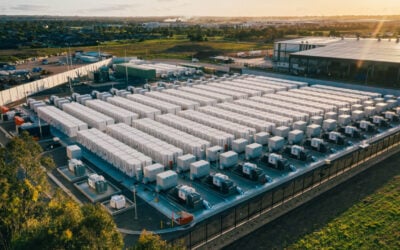The German solar industry association, BSW Solar, has created an extensive report on safety for lithium-ion battery-based energy storage systems for home use, and plans to publish an English language version soon.
Christian Hallerberg, spokesman for BSW Solar, told PV Tech on Thursday that the report, currently published in German only, is in the process of being translated and will hopefully be available in English during next week.
Safety standards for energy storage systems, which is a relatively new technology in terms of widespread deployment, has been an issue of concern for many in the solar and electrical industries for some time. Standardisation of safety rules is still being developed, even in Germany which has a rapidly maturing market for energy storage systems, with some industry sources predicting that residential system sales in the country will number in the tens of thousands within a handful of years. Testing and consultation firm TÜV SÜD began issuing its own certificates for safety standards in August.
The 24-page report has been compiled in conjunction with BSW Solar’s energy storage counterpart, the Federal Association of Energy Storage (BVES) and related trade associations in the electrical and technology sector. Testing laboratories VDE, TUV Rheinland and CETECOM agreed on uniform test criteria for the study.
Try Premium for just $1
- Full premium access for the first month at only $1
- Converts to an annual rate after 30 days unless cancelled
- Cancel anytime during the trial period
Premium Benefits
- Expert industry analysis and interviews
- Digital access to PV Tech Power journal
- Exclusive event discounts
Or get the full Premium subscription right away
Or continue reading this article for free
According to BSW Solar, the three main areas that the guide covers are that storage devices should not cause safety hazards even in the case of a system error, a set of recommended objectives for manufacturers to pursue and the need for an industry-wide set of rules and standards for safety. The association also calls for further contributions on the topic from industry participants not already involved in producing the guide.
Unsurprisingly for a country that raced ahead to get its solar industry to maturity, Germany has been among the international forward-thinkers on storage, offering a financial support scheme that offers a contribution to the upfront cost of lithium-ion storage systems. The scheme, according to some, has been more successful in fostering awareness of energy storage paired with solar among the wider public than in actually resulting in installations. This is due to the perceived complicated nature of the subsidy scheme’s rules.
Residential storage systems in production at German manufacturer Sonnenbatterie. Image: Sonnenbatterie.
SMA, the inverter manufacturer, which participated in creating the new guide, told PV Tech the document will go some way to “filling the gap” until certified standards and norms can be created and adopted at an industry-wide level.
“SMA welcomes the report which for the first time gives guidance for the manufacturing and operating for storage systems and fills the gap until final norms and standards will be developed,” a spokeswoman said.
“We are now seeking to get the respective certification for the Sunny Boy Smart Energy [storage battery inverter]. Safety has highest priority for SMA in the development of our storage systems.”
The International Battery and Energy Storage Alliance (IBESA), recently put out a brief set of interviews with experts and industry figures on the same subject, in preparation for a white paper which the trade body will publish early in the New Year. According to an interview in the IBESA report with Thomas Timke, an expert on lithium-ion at Karlsruhe Institute of Technology (KIT), in such a new industry, there is a danger that a genuine understanding of safety issues could be overlooked in favour of marketing and advertising hype.
Speaking specifically about lithium iron phosphate batteries, which are widely considered to be safer than some other chemistries, Timke said nonetheless that the batteries are not without their risks and that consumers should be cautious over marketing claims.
“…Intrinsic safety of cells or the cells’ inability to catch fire are nothing but advertising slogans. I have never heard anything like this from the cell designers at the cell producers,” Timke said.
“Lithium iron phosphate is a great material, which has developed very well in the past few years, for example with respect to cycle durability. But a good safety behaviour and cycle durability of cells is only given with a high production quality.”





